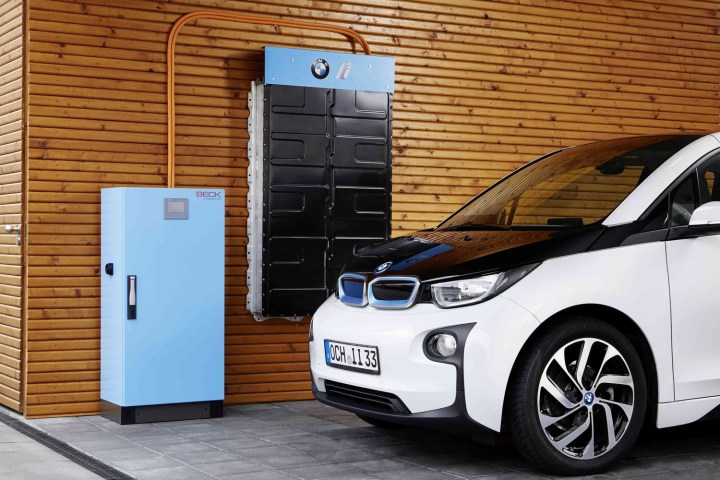
Unveiled at the Electric Vehicle Symposium & Exhibition 29 (EVS29) in Montreal, the system uses batteries from the BMW i3. It will be available in 22-kilowatt-hour and 33-kWh sizes, which interestingly enough corresponds to the battery-pack sizes of the current i3 and the longer-range 2017 model that will go on sale later this year. BMW says there is enough capacity to operate “a variety of appliances and entertainment devices” in a home for up to 24 hours.
The carmaker also claims its system will be the first on the market to incorporate “second-life” batteries. These are older batteries removed from electric cars after losing too much storage capacity. Even when they’ve degraded too much for automotive use, lithium-ion battery packs typically have plenty of usable capacity left. BMW will initially use new batteries only, and mix in second-life batteries as they become available.
Read more: LAPD leases 100 BMW i3 electric cars
Investing in energy storage makes sense for automakers not just because it relies on the same battery technology as electric cars, but because it can be beneficial to the owners of those cars. Energy-storage battery packs can collect energy from solar panels that would normally be dumped back into the grid, and store it for later use. Attaching a charging station to that system lets owners lower a car’s overall carbon footprint by ensuring that more of the electricity that powers it comes from a renewable source.
The commercial launch of BMW’s energy storage system comes after years of research into second-life battery uses. Beginning in 2011, the carmaker has engaged in research projects in the U.S. and Germany to test batteries in energy storage. It used batteries salvaged from Mini E electric cars, prototype vehicles that were leased to customers as a pilot program for what became the i3. Last year, BMW also signed a contract with NextEra to supply batteries from its ActiveE test fleet for energy storage.
There’s no word yet on when the BMW home batteries will become available, or how much they will cost. Like Tesla, BMW may pursue both commercial and home applications for its battery packs.
Editors' Recommendations
- You’ll soon be able to watch YouTube videos in your Android Automotive car
- Intel’s budget Core i3-12100 outperformed AMD’s Ryzen 5 3600 in many games
- Soon you’ll be able to exercise by racing a virtual ghost of your past self
- You’ll soon be able to stream songs in Sony’s 360 Reality Audio format
- You’ll soon be able to have Alexa make a donation to your favorite candidate


